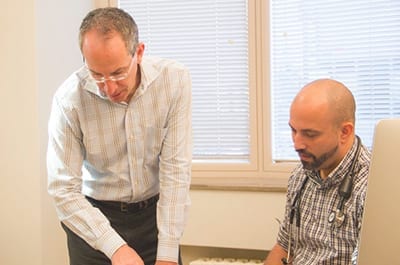 This past Thursday, Dr. Abramson and I attended the Quantified Self Conference in the Presidio in San Francisco. We hosted a morning breakout session titled “Quant-Friendly Doctors and Doctor-Friendly Quants” that drew a very passionate and diverse crowd. We began by describing what exactly it is we are doing in our medical practice with self-tracking and our unique Quant Coaching Program. The questions and debates sparked were interesting and at times emotionally charged. Little did we know that one astute woman in the audience was live tweeting the whole thing!
This past Thursday, Dr. Abramson and I attended the Quantified Self Conference in the Presidio in San Francisco. We hosted a morning breakout session titled “Quant-Friendly Doctors and Doctor-Friendly Quants” that drew a very passionate and diverse crowd. We began by describing what exactly it is we are doing in our medical practice with self-tracking and our unique Quant Coaching Program. The questions and debates sparked were interesting and at times emotionally charged. Little did we know that one astute woman in the audience was live tweeting the whole thing!
Whitney Boesel is a sociology PhD student who writes for Cyborgology, and studies mood tracking and the sociology of new technology. During our hour-long session, Whitney tweeted 29 times. She was able to boil down some of Dr. Abramson’s core values and aspects of our Quant Coaching Program to a series of 140 character messages.
Among QSers there’s a wide range of interest in institutional medicine/willingness to even talk to a doctor.
Similarly, doctors range widely in their willingness to work with QSers- some are not willing to give up authority and control.
@PaulAbramsonMD has a quant coach in his practice – someone to help with your project/process, but not at MD rates.
Some of @PaulAbramsonMDs quant patients are still tracking with his office, some had had problems solved, others have dropped out.
@PaulAbramsonMD not surprised that some quant patients have stopped tracking; tracking can be exhausting, especially over time.
“This is an individualized approach. We WILL NOT turn it into a study.” @PaulAbramsonMD re: outcomes/tracking as intervention.
Once patients start tracking something, experiment protocols and treatments usually end up changing. Lots of unexpected findings!
The more interesting stuff in tracking is the *missing* data – for instance, what happened for the 3 meals that someone *didn’t* photograph?
Passive tracking is much less interesting -@PaulAbramsonMD finds patients learn more with manual tracking (& data review w/ coach).
@PaulAbramsonMD: Self-tracking data belongs to patients; their data itself does not go into their medical files (in his practice).
Part of why @PaulAbramsonMD can work w/ quant patients is that he doesn’t take insurance (though many patients get reimbursed).
@PaulAbramsonMD: “in managed care settings, you never really get to the bottom of things” & never get to answer all the questions.
“There are a number of people for whom paleo is extremely bad” -@PaulAbramsonMD on why there’s no 1 size fits all nutrition advice.
Patients who are the most driven are most successful; others don’t track as rigorously (&don’t need/want to pay for help).
In quant patient practice, @PaulAbramsonMD puts more time in with patients in beginning; finds they need him less later on as a result.
“If you don’t have a serious condition, don’t track” -@PaulAbramsonMD thinks most ppl doing ‘curiosity tracking’ get bored & stop.
“They start taking pictures of their 5 bourbons a night…& we thought we were tracking for weight management!!”
Doctors who are too mired in 8-to-12-minute visit systems can’t do this -@PaulAbramsonMD re: his quant patient model.
I order WAY fewer tests now than I did working in managed care -@PaulAbramsonMD on his quant patient practice.
@PaulAbramsonMD jokes that MD stands for ‘Material Doctor’ – most patients are looking for physical reasons/triggers for problems.
“We’re trying to focus on each individual. we’re not focusing on populations.”-@PaulAbramsonMD on his ‘quant patient’ practice.
Q for @PaulAbramsonMD “how would you convince colleagues or other physicians to think like you?” (room chuckles).
“It’s the conversation abt the data that has value, not the data itself -@PaulAbramsonMD on why no self tracking data in patient files.
@PaulAbramsonMD “insurance companies have never really paid for prevention.” early detection is not the same thing.
“I want to work w/individuals, not theories. My bias is…I’ve never really been interested in pleasing The Man.” -@PaulAbramsonMD.
@PaulAbramsonMD defending his extreme disinterest in working directly w/ insurance companies or trying to change managed care.
“When I say I don’t want to work in the system or with insurance companies, ppl say ‘HOW DARE YOU’…but I only owe my patients.’ -@PaulAbramsonMD
Q re: avoid nightshades: “I haven’t met anybody…who figured out that kind of thing by listening to insurance companies, by doing whats prescribed.”
“I am 44 yrs old…I have limited # of productive years. This is how I want to spend them” -@PaulAbramsonMD on his own practice over activism.
We'd like to thank Whitney for her reporting skills, and look forward to next time! We will be happy to engage in discussion if one emerges.









